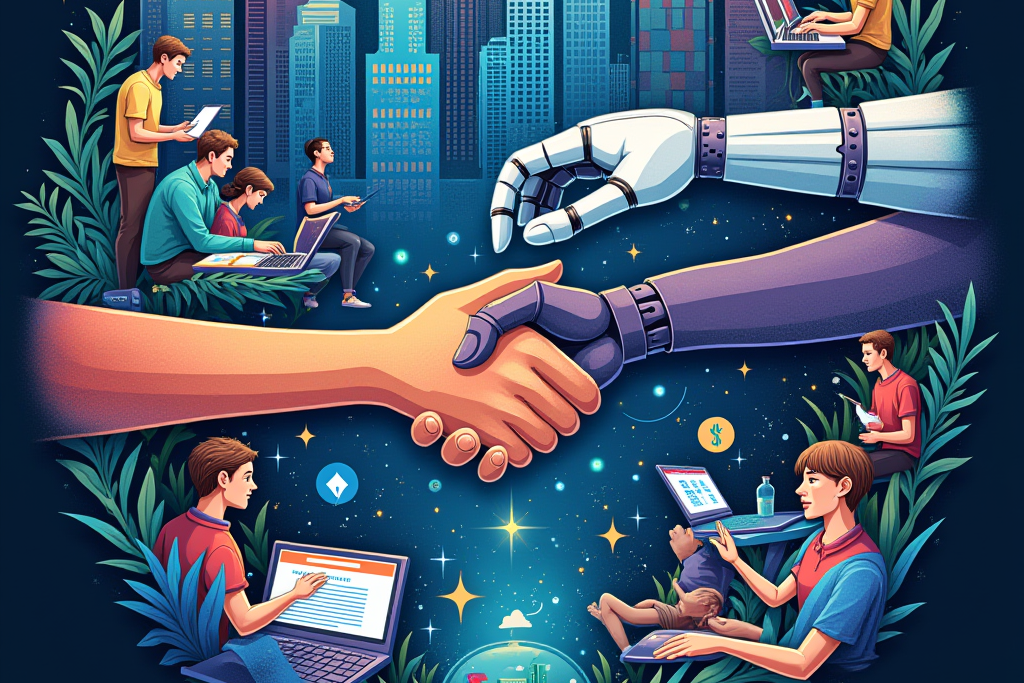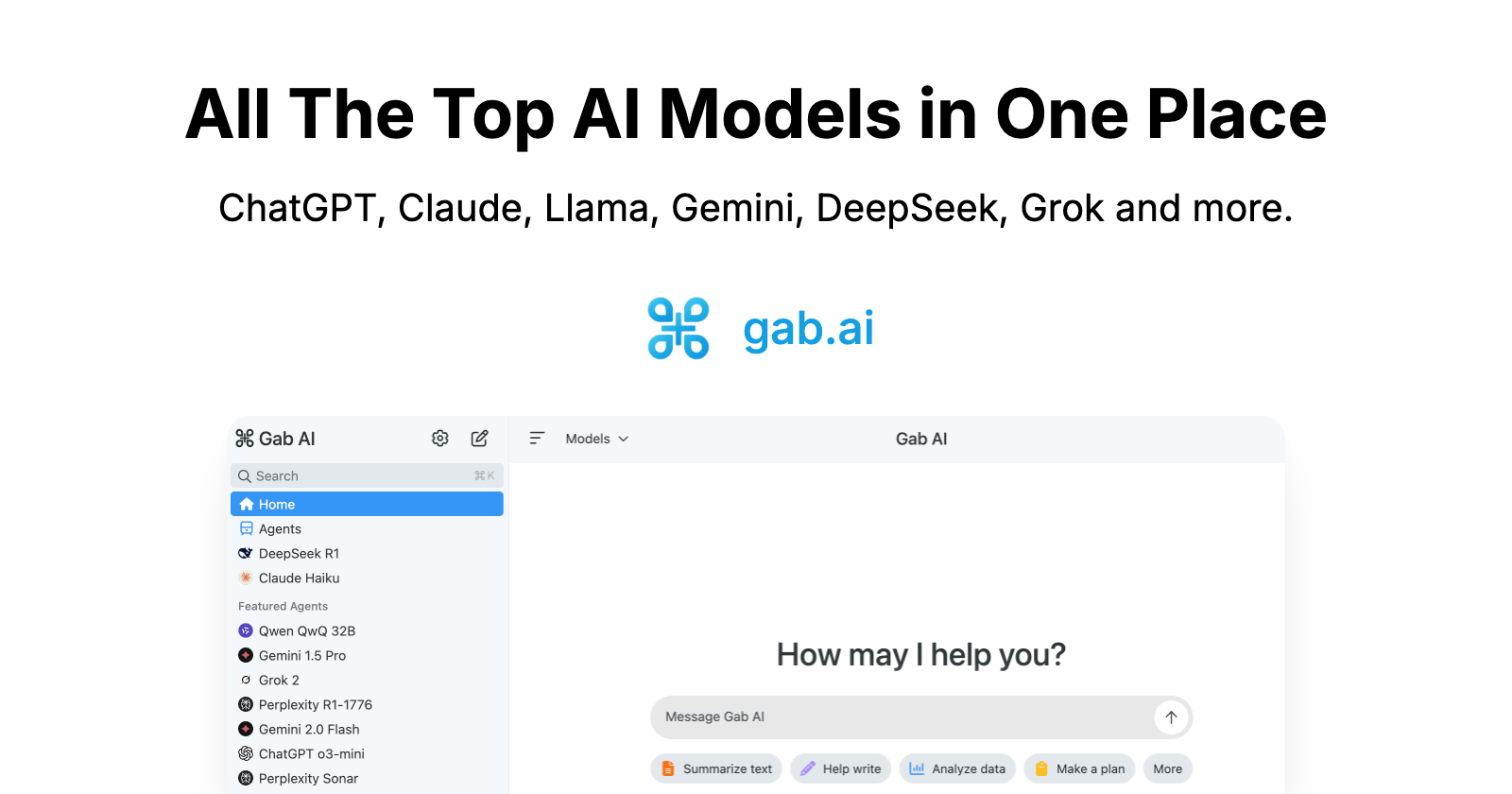Top AI News This Week (April 12–18, 2025)

TL;DR—This Week in AI, at a Glance
This week, the AI sector showcased:
- Record-shattering investment and scale (OpenAI, Meta)
- Breakthroughs in AI hardware and model efficiency (Google Ironwood, DeepSeek)
- Open source and global AI expansion (China’s education push, monster models)
- Real-world integrations (Design tools, quantum, productivity, security)
- Big new questions for ethics and sustainability (Privacy probes, water and energy use)
The message is clear: AI’s pace of change is accelerating, reshaping everything from business to creativity, and putting privacy, sustainability, and access at center stage. Stay tuned—next week already promises even bigger headlines in this unstoppable AI revolution.
Use all the top AI models in one dashboard with Gab AI.
Gab AI: New Interface, Custom Agents, and Major Model Additions
Gab AI made headlines this week with a major platform refresh and powerful new features for its growing user base. The company rolled out a brand new, streamlined interface designed to improve user experience and workflow.One of the biggest features: a custom AI agent maker that enables anyone to design and deploy their own artificial intelligence agent tailored to specific tasks or conversations. This puts more creative control and personalization directly in users’ hands, further democratizing advanced AI tools.
On the model front, Gab AI now includes support for ChatGPT 4.1, the compact and fast o4-mini, and the highly anticipated Llama 4. These additions give users a much wider range of cutting-edge model options, making Gab AI a more versatile and powerful platform for both everyday conversations and specialized workflows.
The world of artificial intelligence just wrapped up another blockbuster week, with developments spanning mega-funding, open-source leaps, next-gen hardware, and real-world breakthroughs. Whether you’re in big tech, research, design, or simply curious about our AI-driven future, here’s your essential roundup of the week’s biggest headlines and trends.
🚀 OpenAI: $40 Billion Funding, Benchmark Transparency, and a New Open-Source Tease
OpenAI dominated the news cycle after clinching a jaw-dropping $40 billion funding round led by SoftBank, vaulting its valuation to a staggering $300 billion. But the money wasn’t the only headline. OpenAI hinted at their most ambitious move yet: open-sourcing a powerful new language model—potentially upping the ante in the fiercely contested open LLM space.On the research front, OpenAI introduced “PaperBench,” a comprehensive benchmark that assesses how well large language models (LLMs) can handle complete academic workflows—from digesting dense research papers to designing experiments. Interestingly, Anthropic’s Claude 3.5 Sonnet outperformed OpenAI’s own models on PaperBench, marking a new level of transparency in LLM benchmarking.Another viral update: native image generation is now built into GPT-4o, sparking a wave of Ghibli-style portraits and hugely popular media trends. But as these AI tools go mainstream, so do their hidden costs—a new study revealed multimodal systems like GPT-4 now consume up to 500mL of water for every 100-word response, highlighting growing concerns around AI’s environmental footprint.
🧠 Google: “Ironwood” TPUs, Multimodal Editing, and Enterprise AI
Google seized the spotlight at Cloud Next, unveiling “Ironwood”—their most advanced Tensor Processing Unit (TPU) ever. With claims of 24x the performance of today’s top supercomputers, Ironwood is designed for the “age of inference,” making it easier and more affordable for enterprises to deploy massive, proactive AI systems at scale.Meanwhile, DeepMind is fusing its Gemini AI models with “Veo” video generation technology. This multimodal approach now allows for AI-driven video expansion, object removal, and even automated cinematic stylization—pushing the envelope for creative freedom and productivity.Not to be outdone, Gemini AI has grown its productivity chops: users can now convert Google Docs into podcasts with a click and receive advanced spreadsheet assistance—showing just how thoroughly AI is weaving itself into our work lives.
🐉 China & Open Source: Megamodels, AI Agents, and Mandatory AI Literacy
Chinese AI startups made a global splash this week. DeepSeek launched a monumental 685-billion-parameter Mixture-of-Experts model, sharing its internal inference tech with the open-source community and rapidly accelerating deployment for large models. Meanwhile, Zhipu AI rolled out “AutoGLM Rumination,” a free AI assistant for everything from research to travel planning and web browsing, stoking competition in the hot “AI agent” space.In a move that could reshape the global talent pool, China announced AI education will be mandatory for all students starting this year—a clear signal of its intent to lead the next tech era.
🏢 Big Tech: Investment Surges, Cooling Periods, and Privacy Prioritization
Meta (formerly Facebook) unveiled plans to pour up to $65 billion into AI infrastructure this year. Microsoft, however, made a surprise move by canceling a billion-dollar data center project in Ohio, citing power delays and a “cooling period” as demand dynamics shift. Still, Microsoft’s Security Copilot rolled out new autonomous AI agents for cyber defense—demonstrating AI’s real-world role as digital threats hit all-time highs.Apple, meanwhile, is doubling down on privacy, emphasizing the use of synthetic and anonymized data for AI model training in all external communications.
⚛️ Quantum AI: From National Missions to Out-of-This-World Sensors
Quantum computing and AI drew closer, too. India’s QpiAI introduced a new 25-qubit superconducting quantum computer as part of the country’s National Quantum Mission. NASA announced progress toward a first-in-space quantum gravity sensor, expanding the frontiers of planetary science. Elsewhere, Honda and BlueQubit demonstrated quantum-enhanced image classification for automotive data sets, pointing to a fast-approaching future of quantum-AI synergy.Google highlighted practical impacts as well: its “AI co-scientist,” powered by Gemini 2.0, is already collaborating with human researchers on biomedical breakthroughs by generating hypotheses and mapping out new experimental protocols.
⚖️ Regulation & Risks: Data Privacy and Sustainability Under Scrutiny
Regulatory challenges met the week’s optimism head-on. European privacy regulators launched investigations into Meta and X (formerly Twitter) regarding their use of personal data in AI training, underscoring the growing scrutiny over how user data fuels large language models.Environmental costs drew new attention, too. Fresh research spotlighted the huge water and energy requirements of modern AI systems, foreshadowing sustainability challenges as data center demands are predicted to quadruple by 2030.
Check out Gab AI and Access All the Top AI Models In One Dashboard



